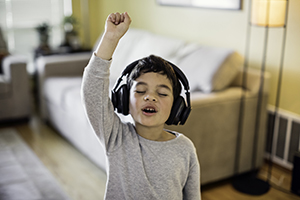Music and Your Child
You can download this article as a PDF (English) (Spanish).

Music can be used to tell a story, communicate feelings, inspire movement and create chances to connect and interact. Throughout history, music has been used in times of celebration, mourning and religious gatherings.
Research shows that when listening to music, and especially playing music, many areas of the brain are activated. This is how music can support motor, language and cognitive development. Music can also decrease pain and distress while increasing coping skills and creative expression.
Here are some tips to engage your child in music.
Babies
- Smile, look into your baby’s eyes and sing.
- Play music for only 15 minutes at a time and take long breaks.
- Gently play an instrument in front of your child and encourage them to follow it with their eyes and reach for it with their hands.
- Allow some time to quietly watch how your baby responds when you use music with them.
Toddlers
- Sing familiar songs they like or use recorded music to ease transitions such as nap, bath, bedtime and outings.
- Sing songs with hand motions like the Itsy Bitsy Spider and The Wheels on the Bus.
- Use songs like Head, Shoulders, Knees and Toes to help your child learn body parts.
- Encourage your child to clap and dance along to music.
- Pause your singing so your child can finish a line in a song. This encourages memory skills and interaction.
- Sing a song to comfort and redirect your child when they are upset. It can help parents too, during stressful times.
Preschoolers
- Sing the ABC song to help your child learn to say letters.
- Practice listening when you go different places and play a “What sounds can you hear?” game.
- Use music to help your child understand concepts like up and down, loud and soft, and start and stop. Try moving a scarf up and down to model movement of a melody.
School-Age
- Listen to different kinds of music.
- If your child shows an interest in an instrument, they may be ready for formal lessons.
- Find music that your child enjoys and encourage them to play this music when they are dealing with tough emotions.
- Attend music performances and talk about the music afterward.
Teens
- Show interest in the music your teen likes.
- Ask your teen to describe what they like about their favorite music.
- Ask your teen about any triggers or intense subjects in music that may cause emotional reactions. Discuss your family’s rules around music and music videos, covering topics like curse words and explicit content.
- Be patient as they listen to different types of music. They are exploring and developing their identity.
- Think about using music as an opportunity for more communication with your teen.
There is so much music available. Discovering music together can be lots of fun. Use your library, YouTube, or music websites as a resources to explore and “try out” different kinds of music. However you decide to enjoy music, trust your own ears and have fun making and listening to music with your child.
